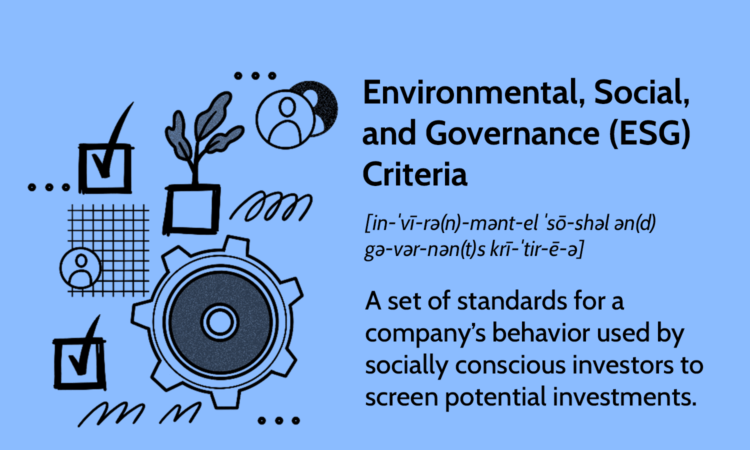
What Is ESG Investing?
ESG stands for environmental, social, and governance. ESG investing refers to how companies score on these responsibility metrics and standards for potential investments. Environmental criteria gauge how a company safeguards the environment. Social criteria examine how it manages relationships with employees, suppliers, customers, and communities. Governance measures a company’s leadership, executive pay, audits, internal controls, and shareholder rights.
Key Takeaways
- Environmental, social, and governance (ESG) investing is used to screen investments based on corporate policies and to encourage companies to act responsibly.
- Many brokerage firms offer investment products that employ ESG principles.
- ESG investing can help portfolios avoid holding companies engaged in risky or unethical practices.
Investopedia / Julie Bang
How ESG Investing Works
ESG investing is sometimes referred to as sustainable investing, responsible investing, impact investing, or socially responsible investing (SRI). To assess a company based on ESG criteria, investors look at a broad range of behaviors and policies. ESG investors seek to ensure the companies they fund are responsible stewards of the environment, good corporate citizens, and led by accountable managers based on criteria including:
- Environmental: Investors evaluate corporate climate policies, energy use, waste, pollution, natural resource conservation, and treatment of animals. Considerations may include direct and indirect greenhouse gas emissions, management of toxic waste, and compliance with environmental regulations.
- Social: A company’s relationships with internal and external stakeholders are evaluated.Does the company donate a percentage of profits to the local community or encourage employees to volunteer? Do workplace conditions reflect a high regard for employees’ health and safety?
- Governance: Ensures a company uses accurate and transparent accounting methods, pursues integrity and diversity in selecting its leadership, and is accountable to shareholders.ESG investors may require assurances that companies avoid conflicts of interest in their choice of board members and senior executives, don’t use political contributions to obtain preferential treatment or engage in illegal conduct.
ESG investors help inform the investment choices of large institutional investors such as public pension funds. ESG-specific mutual funds and ETFs reached a record $480 billion AUM in 2023.Brokerage and mutual fund companies offer exchange-traded funds (ETFs) and other financial products that follow ESG investing strategies. Robo-advisors including Betterment and Wealthfront have promoted these ESG-themed offerings to younger investors.
ESG Metrics
Investment firms like Boston-based Trillium Asset Management, use a variety of ESG factors to help identify companies positioned for strong long-term performance. The criteria are set by analysts who identify the relevant issues facing specific sectors, industries, and companies.
Trillium’s ESG criteria preclude investments in companies that operate in higher-risk areas or have exposure to coal or hard rock mining, nuclear or coal power, private prisons, agricultural biotechnology, tobacco, tar sands, or weapons and firearms. They do not invest in companies involved in major or recent controversies over human rights, animal welfare, environmental concerns, governance issues, or product safety.
Trillium’s metrics include investments in companies that support the environment through renewable energy sources and published sustainability reports. Social metrics include companies that operate ethical supply chains and avoid overseas labor with questionable workplace or child labor policies. Metrics for governance require companies to embrace diversity on the board of directors and maintain corporate transparency.
Investors and ESG
As ESG business practices gain traction, investment firms track their performance. Financial services companies such as JPMorgan Chase (JPM), Wells Fargo (WFC), and Goldman Sachs (GS) publish annual reports that extensively review their ESG approaches and the bottom-line results.
The ultimate value of ESG investing depends on whether they encourage companies to drive real change for the common good, or merely check boxes and publish reports. That, in turn, will depend on whether the investment flows follow ESG tenets that are realistic, measurable, and actionable.
Tobacco and defense are two industries avoided by many ESG investors, but historically produced above-average market returns and can buck recessionary trends. To support ESG, U.S. investors may be sacrificing returns in exchange for values. Many ESG investors are willing to make that tradeoff, though; according to a survey of Investopedia and Treehugger readers, nearly half of ESG investors said they’d be willing to take a 10% loss over five years to invest in a company that “aligns exceptionally against ESG standards.” But 74% of respondents said that valuation/price was “very or extremely important to them.”
How Is ESG Investing Different From Sustainable Investing?
ESG and sustainability are closely related. ESG investing screens companies based on criteria related to being pro-social, environmentally friendly, and with good corporate governance. Together, these features can lead to sustainability. ESG, therefore, looks at how a company’s management and stakeholders make decisions; sustainability considers the impact of those decisions on the world.
What Does ESG Mean for a Business?
Adopting ESG principles means corporate strategy focuses on environment, social, and governance. This means taking measures to lower pollution, and CO2 output, and reduce waste. It also means having a diverse and inclusive workforce, at the entry level and the board of directors.
How Do I Know Which Investments Are ESG?
Several financial firms have ESG ratings and scoring systems. For instance, MSCI has a rating scheme covering over 8,500 companies, giving them scores and letter grades based on their compliance with ESG standards and initiatives. Several other companies, like Morningstar and Bloomberg, have also created criteria for scoring companies on the ESG objectives.
The Bottom Line
ESG investing focuses on companies that follow positive environmental, social, and governance principles. Investors are increasingly eager to align their portfolios with ESG-related companies and fund providers, making it an area of growth with positive effects on society and the environment.






